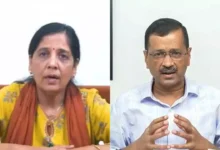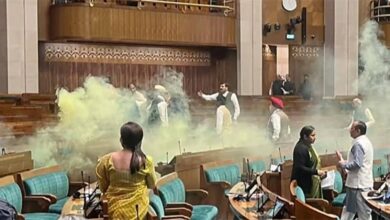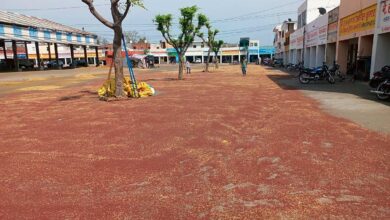“People are aware of the party’s rapid advancement; they predict 370 seats.”
Nitin Gadkari, the minister of Union Road, Transport, and Highways, describes himself as a social worker rather than a politician. One of the most effective ministers in the government, Gadkari forecasts both a BJP victory in more than 370 seats and a third term for Prime Minister Narendra Modi.

In Nagpur, Gadkari takes a break from his campaign schedule to tell Rajesh Kumar Thakur how much he believes in “empowerment politics.”
From Nagpur, you are seeking a third term. What level of “josh”—or enthusiasm—are folks exhibiting?
For the proper individual, the “janata ka josh” is always high. The rapid progress that our administration has been accelerating is well-received by the people of Nagpur. People want to live in a more “Viksit Nagpur” and a “Viksit Bharat.”
What do you want to achieve from this election?
The purpose of this election is growth. Politics, in my opinion, is a mechanism for providing infrastructure, development, and other necessities for a dignified existence with more “ease of living” and “ease of doing developments” to the populace. In
The residents of Nagpur have seen growth and believe that further development is urgently needed.
I never treat someone unfairly because of their caste, creed, or any other factor. I’ve always been a reliable and focused individual. This time, I want to win by a margin of over 5 lakh votes.
Recently, a video of a Muslim man with a disability thanking you for your assistance in helping him make ends meet went viral on social media. How do you provide these kinds of services while you’re involved in politics?
I’ve always been a social worker by nature. We need to reinvent politics at this point. “Power politics” isn’t genuine politics in my opinion. Along with other people-centered endeavors, providing quality services to the impoverished by organizing and taking part in sports and cultural events is a key component of social change. I see politics as a tool for enacting socioeconomic changes.
Many individuals claim to vote for Gadkari without being aware of the party he is associated with, particularly those who are members of minority communities.
I see this as their expression of gratitude for my abilities to earn their trust and for my efforts to promote everyone’s well-being. No caste, religion, language, gender, political party, or philosophy is as important to me. I think that everything is mine and I am for everything, or sab mera hai aur mae sab ka hu.
Southern India is where the BJP says it will pick up more seats. What do you want to achieve?
We anticipate that the South, especially Karnataka, Kerala, Andhra Pradesh, and Telangana, will provide a sizable number of Lok Sabha seats. In these states, the party is more trusted by the populace. They have witnessed PM Modi’s developmental strategy in action, as well as how the nation has performed across the board to become a major player in the world economy during the last ten years. This is the party that prioritizes the country above politics, in contrast to other parties.
What many of seats do you anticipate the BJP gaining in the next parliamentary elections?
The BJP will surpass 370 seats and surpass 400 seats with our friends in the National Democratic Alliance (NDA). People share our goal of a corrupt-free “Viksit-Bharat.” The public has seen the job that our administration, led by Prime Minister Modi, has done over the last ten years in every area. Just one such wing that has shown excellence in performance is my ministry.
What fundamental concerns does the BJP-led NDA have in mind as it seeks a third term in office?
The main concerns are on the developmental tasks that have been completed so far and those that we want to do. It is possible to make a comparison between the 60 years of the Congress Party and the 10 years of the Modi and BJP-led Central administration. The public is certain that only the BJP and Modi Ji have the power to alter this nation’s course.
Developmental difficulties are now of more significance. “Poverty has no regard for religion, caste, or language. Garibi ka koi dharma nahi hota, na hi jaat or na hi koi bhasha.” We must build an economy that lifts people out of poverty, solves issues for people, and produces more employment.
Could you list any significant development projects your ministry has worked on in the last ten years?
Now, a great deal of work is available to see and consider. In addition to being a center for business and education, Nagpur has become a centre for aviation-related endeavours. Everything that is visible now, including communication highways, roads, and other auxiliary components, is a direct result of our performance. The Delhi-Mumbai Express, Ahemedbad-Dhoelra, Bengaluru-Chennai, Delhi-Amritsar, and several other corridors attest to our ministry’s accomplishments in keeping with PM Modi’s vision. The first-ever green step in national highway development is the extensive use of green materials.
Our ministry is involved in many significant initiatives aimed at increasing religious and tourist linkages. These are: the 155-kilometer Ram-Van Gaman Marg, which is expected to be finished by March 2025 at an estimated cost of Rs 4,700 crore; the 5,000-kilometer Ram-Janaki Marg, which is scheduled to be finished by September 2025; the 235-kilometer Ayodhya Parikarma by December 2025; the 300-kilometer Baraj 84 Kosi Parikarma Marg, which is anticipated to be finished by December 2025 at an estimated cost of Rs 5,000; and the 419-kilometer Buddha circuit.
In addition, it is expected that the Kailash Mansarover (366 km) segment would be finished by March 2025 at a cost of Rs 9,500 crore. Ten similar projects have been undertaken in all, and some of them—which span 3,177 km at an estimated cost of Rs 75,000 crore—have already been finished.
What particular projects has your ministry worked on for rural areas?
Numerous projects for rural regions have been completed. We are still building freeways and roads to support the socioeconomic development of 500 aspirational blocks and tribal communities. In the last ten years, villages have seen the construction of about 3.75 lakh kilometers of new roads. They also include important terms from J&K and the Northeast.
We are working on around 800 projects in the Northeast, valued at Rs 3 lakh crore; of them, Rs 42,000 crore have been completed. More than Rs 1 lakh core worth of work has been undertaken in J&K. J&K is home to the Zojila Tunnel, one of Asia’s longest tunnels. The length of the 144 tunnels on J&K’s national routes is 357 km.






